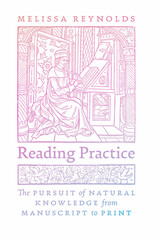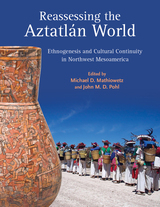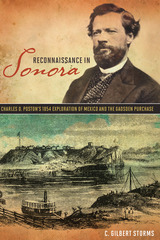3 books about Hinge
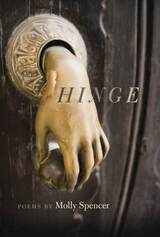
Hinge
Molly Spencer
Southern Illinois University Press, 2020
Finding joy and beauty in the face of suffering
Readers enter “a stunted world,” where landmarks—a river, a house, a woman’s own body—have become unrecognizable in a place as distorted and dangerous as any of the old tales poet Molly Spencer remasters in this elegant, mournful collection. In myth and memory, through familiar stories reimagined, she constructs poetry for anyone who has ever stumbled, unwillingly, into a wilderness. In these alluring poems, myth becomes part of the arsenal used to confront the flaws and failures of our fallible bodies. Shadowing the trajectory of an elegy, this poetry collection of lament, remembrance, and solace wrestles with how we come to terms with suffering while still finding joy, meaning, and beauty.
Spencer alternates between the clinical and the domestic, disorientation and reorientation, awe and awareness. With the onset of a painful chronic illness, the body and mental geography turn hostile and alien. In loss and grief, in physical and psychological landscapes, Spencer searches the relationship between a woman’s body and her house—places where she is both master and captive—and hunts for the meaning of suffering. Finally, with begrudging acceptance, we have a hypothesis for all seasons: there is suffering, there is mercy; they are not separate but are for and of one another.
[more]
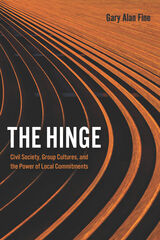
The Hinge
Civil Society, Group Cultures, and the Power of Local Commitments
Gary Alan Fine
University of Chicago Press, 2021
Most of the time, we believe our daily lives to be governed by structures determined from above: laws that dictate our behavior, companies that pay our wages, even climate patterns that determine what we eat or where we live. In contrast, social organization is often a feature of local organization. While those forces may seem beyond individual grasp, we often come together in small communities to change circumstances that would otherwise flatten us. Challenging traditional sociological models of powerful forces, in The Hinge, Gary Alan Fine emphasizes and describes those meso-level collectives, the organizations that bridge our individual interests and the larger structures that shape our lives. Focusing on “tiny publics,” he describes meso-level social collectives as “hinges”: groups that come together to pursue a shared social goal, bridging the individual and the broader society. Understanding these hinges, Fine argues, is crucial to explaining how societies function, creating links between the micro- and macro-orders of society. He draws on historical cases and fieldwork to illustrate how these hinges work and how to describe them. In The Hinge, Fine has given us powerful new theoretical tools for understanding an essential part of our social worlds.
[more]
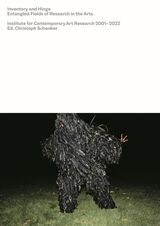
Inventory and Hinge
Entangled Fields of Research in the Arts. Institute for Contemporary Art Research 2001–2022
Edited by Christoph Schenker
Diaphanes, 2023
A history of the pioneering years establishing a new genre in the field of arts: artistic research.
Artistic work connects multiple competencies, areas of knowledge, and ways of life. The Institute for Contemporary Art Research (IFCAR) has made this principle its guiding ethos through organizing research projects in correspondence with this transgressive gesture, manifesting as interdisciplinary, networked knowledge production.
Inventory and Hinge offers an overview of the research projects performed over the last two decades at IFCAR through project descriptions, plentiful illustrations, and, most importantly, links and QR codes that grant access to nearly all publications and websites that were created by the individual projects he discusses.
Although art as research has a long tradition outside of institutions, Inventory and Hinge chronicles IFCAR’s drive to introduce this new discipline and establish a new artistic genre.
Artistic work connects multiple competencies, areas of knowledge, and ways of life. The Institute for Contemporary Art Research (IFCAR) has made this principle its guiding ethos through organizing research projects in correspondence with this transgressive gesture, manifesting as interdisciplinary, networked knowledge production.
Inventory and Hinge offers an overview of the research projects performed over the last two decades at IFCAR through project descriptions, plentiful illustrations, and, most importantly, links and QR codes that grant access to nearly all publications and websites that were created by the individual projects he discusses.
Although art as research has a long tradition outside of institutions, Inventory and Hinge chronicles IFCAR’s drive to introduce this new discipline and establish a new artistic genre.
[more]
READERS
Browse our collection.
PUBLISHERS
See BiblioVault's publisher services.
STUDENT SERVICES
Files for college accessibility offices.
UChicago Accessibility Resources
home | accessibility | search | about | contact us
BiblioVault ® 2001 - 2024
The University of Chicago Press


